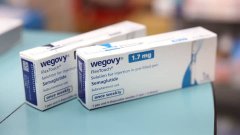
European Union drug regulators found that highly popular such as Wegovy and Ozempic are linked to an increased risk of , the regulator said Friday.
The European Medicines Agency conducted a into so-called GLP-1s, a blockbuster class of treatments that mimic a hormone produced in the gut to suppress a person's appetite. Those drugs have skyrocketed in demand over the last year despite their hefty price tags and spotty insurance coverage.
The review examined several drugs from , including Wegovy and Ozempic. It did not include 's Zepbound and Mounjaro, two versions of the same drug sold for weight loss and diabetes. But the probe did include the active ingredient in an older diabetes treatment from Eli Lilly called Trulicity.
In a statement to CNBC, Novo Nordisk confirmed the findings of the EMA's investigation and said it will continue to monitor reports of adverse reactions to its GLP-1s, including suicide and suicidal ideation.
The agency's verdict is the latest in a series of reassuring reports on suicide risk for GLP-1s. The U.S. Food and Drug Administration came to a similar in January but said agency officials couldn't definitively rule out that a "small risk may exist."
Clinical trials from Novo Nordisk and Eli Lilly have not demonstrated a link between GLP-1s and suicidal thoughts. Still, researchers and doctors have been on the lookout for any new unwanted side effects or added risks as thousands of new patients start taking the drugs.
The EMA first launched its investigation in July after the Icelandic Medicines Agency flagged three cases of suicidal thoughts and self-injury in patients taking drugs containing liraglutide and semaglutide, the active ingredients in the popular treatments.
Semaglutide is the active ingredient used in Wegovy, Ozempic and Novo Nordisk's diabetes pill Rybelsus. Liraglutide is the active ingredient in Novo Nordisk's older weight loss drug Saxenda. The probe also included other active ingredients in older weight loss and diabetes drugs, including dulaglutide, exenatide and lixisenatide.
The EMA on Friday said it analyzed results from a large U.S. study and did not find a direct association between the use of semaglutide and suicidal thoughts. Results from another study conducted by the agency also did not support a link between GLP-1 drugs and the risk of suicidal thoughts.
Both the studies were based on electronic health records.
If you are having suicidal thoughts or are in distress, contact the at 988 in the U.S. or the in the U.K. at 116 123 for support and assistance from a trained counselor.




